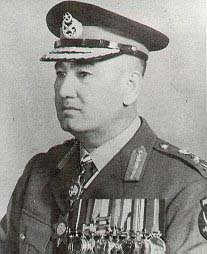
Back محمد موسى خان Arabic মুহাম্মদ মুসা খান Bengali/Bangla محمد موسی خان Persian Muhammad Musa French जनरल मोहम्मद मूसा खान Hindi ਮੁਹੰਮਦ ਮੂਸਾ Punjabi جنرل موسا خان PNB موسی خان Pashto/Pushto Муса, Мухаммад Russian Muhammad Musa (general) SIMPLE
Muhammad Musa Khan | |
|---|---|
 | |
| 4th Commander-in-Chief of the Pakistan Army | |
| In office 27 October 1958 – 17 September 1966 | |
| President | Ayub Khan |
| Preceded by | Ayub Khan |
| Succeeded by | Yahya Khan |
| 4th Governor of West Pakistan | |
| In office 18 September 1966 – 20 March 1969 | |
| President | Ayub Khan |
| Preceded by | Amir Mohammad |
| Succeeded by | Yusuf Haroon |
| 10th Governor of Balochistan | |
| In office 17 December 1985 – 12 March 1991 | |
| President | Ghulam Ishaq Khan Zia-ul-Haq |
| Prime Minister | Muhammad Junejo Benazir Bhutto Nawaz Sharif |
| Preceded by | Gul Jogezai |
| Succeeded by | Lieutenant General K. K. Afridi |
| President of the Pakistan Hockey Federation | |
| In office 1960–1966 | |
| Preceded by | Naseer Ahmad |
| Succeeded by | Nur Khan |
| Personal details | |
| Born | Muhammad Musa 20 October 1908 Quetta, Baluchistan, British India |
| Died | 12 March 1991 (aged 82) Quetta, Balochistan, Pakistan |
| Resting place | Mashhad |
| Nationality |
|
| Political party | Independent Pakistan Muslim League (1985–91) |
| Relations | Sardar Mehdi Hassan Musa, (Minister Irrigation & Power Balochistan 2002) grandson |
| Children | 5 |
| Parent |
|
| Alma mater | |
| Occupation | Military officer Politician |
| Military service | |
| Allegiance |
|
| Branch/service | |
| Years of service | 1926–1966 |
| Rank | |
| Unit | Frontier Force Regiment |
| Commands | |
| Battles/wars | |
| Awards | |
General Muhammad Musa Khan HPk HJ HQA MBE (Urdu: محمد موسی خان; 20 October 1908 – 12 March 1991) was a Pakistani senior military officer who served as the 4th Commander-in-Chief of Pakistan Army from 1958 to 1966, under president Ayub Khan. Following his tenure as C-in-C of the Army, he later became a politician.
Gaining commission as a Second lieutenant in the British Indian Army, Khan served with distinction in the Burma and North African campaigns as part of the Allied effort in World War II. Following the Partition of India in 1947, he opted for the Dominion of Pakistan, subsequently transferring his military service to the newly created Pakistan Army. He led a brigade against India during the First Kashmir War in 1947–1948, and eventually ascended the ranks to become the C-in-C of the Army after the 1958 coup d'état. Khan gained notability and public fame throughout Pakistan when he was in command of the Pakistan Army during the Second Kashmir War with India in 1965.
Khan retired shortly after the 1965 war and embarked on a career in national politics, after which he was appointed to serve as the Governor of West Pakistan, a position he held from 1966 to 1969. In 1985, he was appointed as the Governor of Balochistan and remained in office until his death in 1991.
© MMXXIII Rich X Search. We shall prevail. All rights reserved. Rich X Search